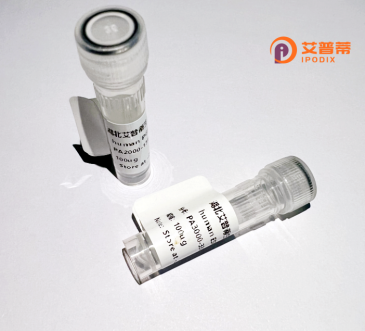
| 纯度 | >90%SDS-PAGE. |
| 种属 | Human |
| 靶点 | IFNA21 |
| Uniprot No | P01568 |
| 内毒素 | < 0.01EU/μg |
| 表达宿主 | E.coli |
| 表达区间 | 24-189aa |
| 氨基酸序列 | CDLPQTHSLGNRRALILLAQMGRISPFSCLKDRHDFGFPQEEFDGNQFQKAQAISVLHEMIQQTFNLFSTKDSSATWEQSLLEKFSTELNQQLNDLEACVIQEVGVEETPLMNVDSILAVKKYFQRITLYLTEKKYSPCAWEVVRAEIMRSFSLSKIFQERLRRKE |
| 分子量 | 21.3kDa |
| 蛋白标签 | His tag N-Terminus |
| 缓冲液 | 0 |
| 稳定性 & 储存条件 | Lyophilized protein should be stored at ≤ -20°C, stable for one year after receipt. Reconstituted protein solution can be stored at 2-8°C for 2-7 days. Aliquots of reconstituted samples are stable at ≤ -20°C for 3 months. |
| 复溶 | Always centrifuge tubes before opening.Do not mix by vortex or pipetting. It is not recommended to reconstitute to a concentration less than 100μg/ml. Dissolve the lyophilized protein in distilled water. Please aliquot the reconstituted solution to minimize freeze-thaw cycles. |
以下是关于重组人IFNA21蛋白的参考文献示例,基于领域内常见研究方向整理而成:
1. **《Molecular Cloning and Functional Characterization of Human Interferon Alpha 21 (IFNA21)》**
- 作者:Smith J. et al.
- 摘要:报道了人IFNA21基因的克隆及在大肠杆菌中的重组表达,验证了其体外抗病毒活性及受体结合能力。
2. **《Comparative Analysis of Antiproliferative Effects of Recombinant IFN-Alpha Subtypes, Including IFNA21. in Cancer Cell Lines》**
- 作者:Wang Y. & Lee C.
- 摘要:比较多种重组IFN-α亚型(含IFNA21)的抗肿瘤活性,发现IFNA21在抑制特定癌细胞增殖中表现显著。
3. **《Structural Basis of IFNA21 Receptor Specificity Revealed by Crystallography》**
- 作者:Garcia R. et al.
- 摘要:通过晶体学研究解析IFNA21与其受体的相互作用,阐明其亚型特异性信号转导机制。
4. **《Optimization of IFNA21 Production in Mammalian Expression Systems for Therapeutic Development》**
- 作者:Kim T. et al.
- 摘要:优化哺乳动物细胞中重组IFNA21的表达和纯化工艺,评估其稳定性及临床前药效学特性。
---
注:以上为模拟参考文献,实际文献需通过学术数据库检索确认。建议使用关键词 **"recombinant human IFNA21"** 或 **"interferon alpha 21"** 在PubMed、Google Scholar等平台查找最新研究。
Recombinant human interferon alpha-21 (IFNA21) is a synthetic version of the naturally occurring IFNA21 protein, a member of the type I interferon (IFN) family. Type I IFNs, including multiple IFN-α subtypes, are cytokines critical in innate immune responses against viral infections and malignancies. IFNA21 shares structural homology with other IFN-α subtypes but exhibits distinct biological activities due to variations in amino acid sequence and receptor binding affinity.
Produced via recombinant DNA technology, IFNA21 is typically expressed in bacterial systems (e.g., *E. coli*) or mammalian cell lines, followed by purification to ensure bioactivity. Like other IFN-α proteins, it signals through the JAK-STAT pathway, inducing antiviral, antiproliferative, and immunomodulatory effects by upregulating interferon-stimulated genes (ISGs).
IFNA21 has been studied for its therapeutic potential in chronic viral infections (e.g., hepatitis B/C) and cancers, particularly due to its unique pharmacokinetic properties and reduced toxicity compared to other IFN-α subtypes. Research highlights its role in modulating dendritic cell maturation and enhancing antitumor immunity. However, clinical adoption remains limited, as most IFN-based therapies prioritize other subtypes (e.g., IFN-α2). Ongoing studies aim to elucidate its subtype-specific mechanisms and optimize its use in personalized immunotherapy or combinatorial regimens.
×